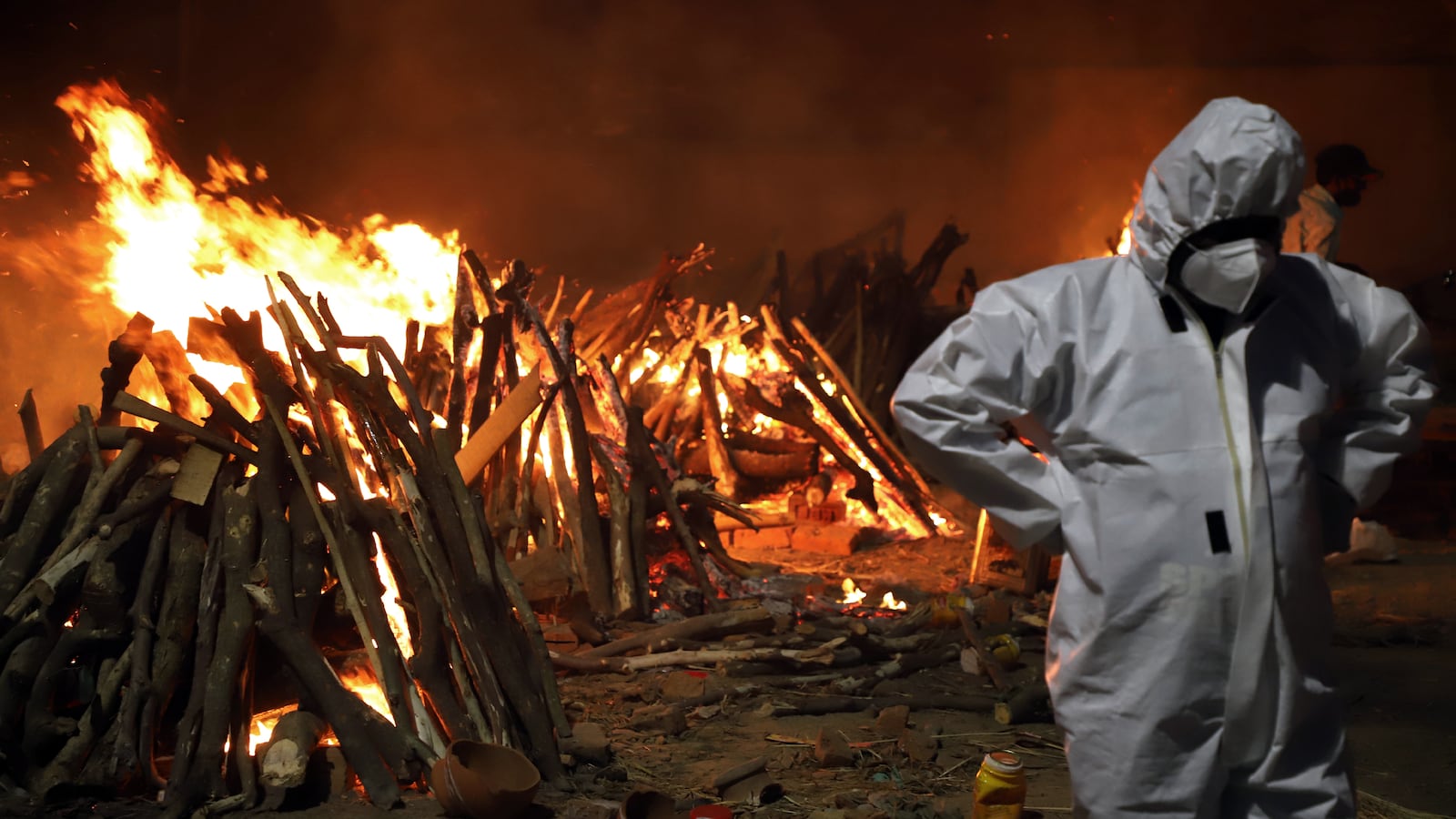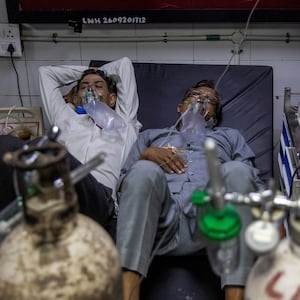NEW DELHI—Dozens of people piled outside of the largest COVID-19 hospital in India’s capital city, gasping for breath. Health-care workers performed CPR on dying patients who had been denied admission to the overcrowded facility. The majority of them never make it inside.
After seeing his son struggling to breathe last Sunday, Kamre Aalam rushed to the Lok Nayak Jan Prakash (LNJP) hospital. But with India facing an unprecedented second wave of the novel coronavirus, all 1,500 beds at LNJP were occupied.
Many of the patients who waited outside the hospital doors last week took their last breaths there. After waiting for hours, Rayees Aalam, Aalam’s 26-year-old son, died there too. Dazed, Aalam sat by his son—who was wrapped in a blue disposable plastic bag—inside an ambulance that drove towards the largest cemetery in New Delhi, two miles away from the hospital.
But the cemetery was running out of space too. To meet the rising demand, bulldozers were being used instead of gravediggers. Unlike the older graves, a large patch of land designated for COVID-19 burials was missing gravestones.
The second wave, worsened by the spread of the Indian variant of the virus, has rattled India’s health-care infrastructure, and cases have been surging at a record pace. The country has recorded more than a million cases in the last four days.
In his address to the nation last Tuesday, Prime Minister Narendra Modi—who has been busy campaigning and promoting festivals—suggested that the situation is under control. Meanwhile, Twitter is awash with SOS texts from the families of infected citizens begging for oxygen cylinders, plasma, and even Remdesivir—an antiviral drug which hospitals ran out of a month ago.
The death toll is piling up quickly, too: almost two people are losing lives to COVID-19 every minute in India. On Monday alone, over 2,812 died. The true number could be even higher, considering several media reports have suggested that the state is lying about the true rates of infection.
At the cemetery, gravedigger Mohammad Waseem was sitting under the shade of a tree when the ambulance carrying Alaam’s son arrived. “With this, today’s toll goes to 13,” he told The Daily Beast, as he stood up to tend to another grieving family.
Armed with protective gear, Waseem assembled three other men to bring down Rayees’s body from the ambulance, which immediately turned back to the hospital to fetch others. At the cemetery, families are given the option of burying their loved ones in a coffin or wrapped in a shroud, but Aalam, a 52-year-old daily-wage laborer, didn’t have the money to buy a coffin for his recently graduated son. Shroud was cheaper.
Waseem wrapped Reyees in white cloth as his father watched, sobbing alone. The rest of their family members were 120 miles away in a village in Uttar Pradesh, a northern state. Rayees’s wife and two young children—a 2-year-old son and a 5-year-old daughter—were still unaware of his death.

“How will I tell his mother when she will ask me for her son?” Aalam told The Daily Beast, breaking down. “I’ll always regret that he was buried here, away from his home. I wish I could have taken him home and buried him in our ancestral graveyard.”
Waseem has learned to be quick when lowering bodies into graves. Last year, when the virus first broke out in India, he had dug out five 15-foot-deep graves a day in preparation. But the current pandemic wave has been worse than he could have ever imagined.
“This is the deadliest time,” Waseem, who had led over a thousand funeral prayers since March 2020, told The Daily Beast. “I break down every night. I have seen so many bodies, I often break down—my heart and mind, both have gone mad.”
Ninety miles away from his home in Haryana, Waseem hasn’t been able to see his family either. He worries that he might carry the virus home to his children. “Everyone wants to stay away from this virus. No one comes forward to bury them,” he said. “It feels like a responsibility given by God. I can’t escape it.”
As Aalam journeyed home after burying his son, Arvind Kejriwal, the chief minister of Delhi, frantically tweeted: “OXYGEN HAS BECOME AN EMERGENCY IN DEL,” adding that “Delhi is facing acute shortage of oxygen. In view of sharply increasing cases, [we] need much more than normal supply.”
That same day, Kejriwal described the situation as a “race against time” and later begged the Modi government “to urgently provide oxygen to Delhi.” As of Monday, at least 92,000 people are infected with the virus in the capital city.
India’s crisis has threatened other countries’ battles against COVID-19. After a call with India’s prime minister on Monday, President Joe Biden pledged to deliver vital resources and supplies to India, promising “America’s full support to provide emergency assistance and resources in the fight against COVID-19.”
Back at the LNJP, Ishita Goyal, a woman in her twenties, ran down the corridors of the hospital, calling out for her father. She had checked him into the facility last Friday, after he had fallen ill, but wasn’t able to track him down since. The overwhelming number of patients have made it difficult for staff to keep records up to date.
“Dad, Dad!” she shouted, as she tried to find a doctor who could give her some answers. Eventually, she found one.
Perhaps, the doctor told her, he may have died too.



